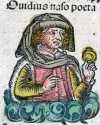 Publius Ovidius Naso, a Roman poet better known as Ovid, is ranked alongside Virgil, Horace, and others as one of the canonical poets of Latin literature. He was a great storyteller whose writings generally deal with the themes of love, mythology, and exile. No other Latin poet wrote so naturally in verse or with such sustained wit, and his works had a decisive influence on European art and literature for centuries. Why did Augustus banish Ovid in 8 CE? Discuss
Publius Ovidius Naso, a Roman poet better known as Ovid, is ranked alongside Virgil, Horace, and others as one of the canonical poets of Latin literature. He was a great storyteller whose writings generally deal with the themes of love, mythology, and exile. No other Latin poet wrote so naturally in verse or with such sustained wit, and his works had a decisive influence on European art and literature for centuries. Why did Augustus banish Ovid in 8 CE? Discuss
Source: The Free Dictionary
 “La Marseillaise” is the national anthem of France. It was written and composed in 1792 by Claude Joseph Rouget de Lisle and became the rallying cry of the French Revolution. Originally known as the “Marching Song of the Rhine Army,” it got its present name because it was first sung on the streets of Paris by troops from Marseille. The words of what famous revolutionary song written in 1870 were intended to be sung to the melody of “La Marseillaise”?
“La Marseillaise” is the national anthem of France. It was written and composed in 1792 by Claude Joseph Rouget de Lisle and became the rallying cry of the French Revolution. Originally known as the “Marching Song of the Rhine Army,” it got its present name because it was first sung on the streets of Paris by troops from Marseille. The words of what famous revolutionary song written in 1870 were intended to be sung to the melody of “La Marseillaise”?  The Tuskegee Airmen, trained at Alabama’s Tuskegee Army Air Field during WWII, made up the US military’s first African-American flying unit. In 1941, congressional legislation forced the Army Air Corps to create an all-black combat unit, and though the War Department aimed to block its formation by instituting a number of restrictive guidelines for applicants, many qualified for service. In all, these airmen flew 1,578 missions, destroyed 261 enemy aircraft, and were awarded how many medals?
The Tuskegee Airmen, trained at Alabama’s Tuskegee Army Air Field during WWII, made up the US military’s first African-American flying unit. In 1941, congressional legislation forced the Army Air Corps to create an all-black combat unit, and though the War Department aimed to block its formation by instituting a number of restrictive guidelines for applicants, many qualified for service. In all, these airmen flew 1,578 missions, destroyed 261 enemy aircraft, and were awarded how many medals?  In Valencia, Spain, the feast of the foster-father of Jesus is a week-long festival called Fallas de San Jose (Bonfires of
In Valencia, Spain, the feast of the foster-father of Jesus is a week-long festival called Fallas de San Jose (Bonfires of 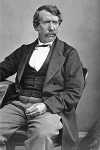 David Livingstone, a Scottish missionary and explorer, was the first European to cross the African continent. Among his many discoveries are the Zambezi River and Victoria Falls. Though he aimed to facilitate the abolition of the slave trade by opening Africa to commerce and missionary stations, he inadvertently contributed to the “Scramble for Africa” instead. He is the subject of the popular quotation, “Dr. Livingstone, I presume?” Who uttered the famous phrase upon meeting him in 1871?
David Livingstone, a Scottish missionary and explorer, was the first European to cross the African continent. Among his many discoveries are the Zambezi River and Victoria Falls. Though he aimed to facilitate the abolition of the slave trade by opening Africa to commerce and missionary stations, he inadvertently contributed to the “Scramble for Africa” instead. He is the subject of the popular quotation, “Dr. Livingstone, I presume?” Who uttered the famous phrase upon meeting him in 1871? 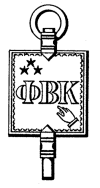 Phi Beta Kappa is an academic honor society with the mission of “fostering and recognizing excellence” in undergraduate liberal arts and sciences. Founded at the College of William and Mary in 1776, it is the oldest such society in the US and today boasts 283 chapters and over half a million living members. Its symbol is a golden key engraved with the image of a pointing finger, the Greek letters from which the society takes its name, and three stars. What principles do these stars represent?
Phi Beta Kappa is an academic honor society with the mission of “fostering and recognizing excellence” in undergraduate liberal arts and sciences. Founded at the College of William and Mary in 1776, it is the oldest such society in the US and today boasts 283 chapters and over half a million living members. Its symbol is a golden key engraved with the image of a pointing finger, the Greek letters from which the society takes its name, and three stars. What principles do these stars represent? 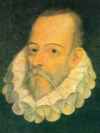 The pen is the tongue of the mind.
The pen is the tongue of the mind. 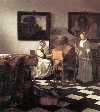 On March 18, 1990, thieves disguised as police officers broke into Boston’s Isabella Stewart Gardner Museum and stole 13 works of art, including paintings by Vermeer, Rembrandt, Manet, and Degas. The crime, considered the largest art theft in US history, remains unsolved. Due to the strict provisions of Gardner’s will, which stipulate that the collection remain unchanged, the paintings’ empty frames remain on display in their original locations. What group is suspected of carrying out the heist?
On March 18, 1990, thieves disguised as police officers broke into Boston’s Isabella Stewart Gardner Museum and stole 13 works of art, including paintings by Vermeer, Rembrandt, Manet, and Degas. The crime, considered the largest art theft in US history, remains unsolved. Due to the strict provisions of Gardner’s will, which stipulate that the collection remain unchanged, the paintings’ empty frames remain on display in their original locations. What group is suspected of carrying out the heist?